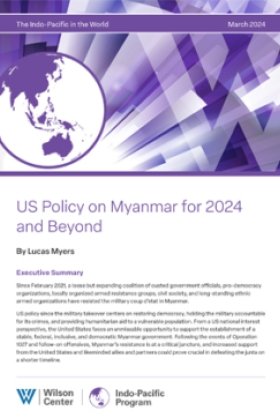Iran: From Civil Society Protest to Political Alternative?
Roberto Toscano, Public Policy Scholar, Woodrow Wilson Center and Former Italian Ambassador to India and to Iran
Overview
Roberto Toscano, Wilson Center Public Policy Scholar and former Italian Ambassador to Iran and India, gave his insights on the role of civil society in the Iranian opposition. Toscano also discussed the similarities and differences between the Iranian opposition movement and those that have arisen in the Middle East in recent months.
On April 4, the Middle East Program hosted a meeting on "Iran: From Civil Society Protest to Political Alternative?" with Toscano. Haleh Esfandiari, Director of the Middle East Program, moderated the event.
Toscano began the discussion by stating that the question of Iranian democracy can be viewed in the wider context of democratization in the Middle East. He commented that throughout the region individual citizens were mobilized by indignation against the stagnant economic, social, and political conditions they faced and the subsequent rejection of tyranny. This stagnation, Toscano discussed, is characterized by the general lack of participatory governance, the low level of female presence in production, and the prevalence of corruption, patronage, and cronyism, which often precludes educated youth from attaining gainful employment. Toscano noted that while Middle Eastern countries are not the poorest in the world, feelings of injustice vis-à-vis ruling elites was enough to mobilize people.
Toscano also compared Iran's socioeconomic landscape to the rest of the region and noted the differences. He stated that Iranian women are more heavily involved in production and there is high literary and scientific output. The initial focus of the Iranian protest has been election fraud, whereas socioeconomic grievances have not been in the forefront. Toscano noted that what also differentiates Iran from other countries in the Middle East is the unique role of the Iranian Revolutionary Guard Corps (IRGC), the fact that Iran has multiple leadership positions as an oligarchic system, and that elements from the Iranian Revolution still carry an ideological and religious clout that resonates even with sympathizers of the Green Movement, many of whom are for "changes in the regime" rather than "regime change."
In terms of compatibility with democracy, Toscano maintained that Iranians will not discard the religious component of whichever form of governance they attempt to forge. He described two kinds of potential secular systems: one that is not hostile to religion and one in which citizenship is not compatible with the role of religion within society. Toscano stated that regardless of whichever form of governance takes hold in Iran, secularists will be both believers and non-believers. Furthermore, he noted that citizenship and religious belief can coexist, but that it is incompatible with democracy for a state to use religion for public control or for religious leaders to pretend to run the state, and not just influence it, without going through democratic channels. Toscano concluded by describing three dimensions of international issues that characterize Iranian foreign policy: the religious dimension, anti-imperialism, and national-interest issues. He noted that for the Green Movement it is easier to criticize the regime in relation to the first two dimensions. The movement, however, has had difficulty discussing the third element, Toscano noted, because the most crucial foreign policy issue is the nuclear question which is widely perceived as a national rather than a regime issue.
By Sara Girgis, Middle East Program
Haleh Esfandiari, Middle East Program
Speaker
Roberto Toscano
Hosted By

Middle East Program
The Wilson Center’s Middle East Program serves as a crucial resource for the policymaking community and beyond, providing analyses and research that helps inform US foreign policymaking, stimulates public debate, and expands knowledge about issues in the wider Middle East and North Africa (MENA) region. Read more
Thank you for your interest in this event. Please send any feedback or questions to our Events staff.









